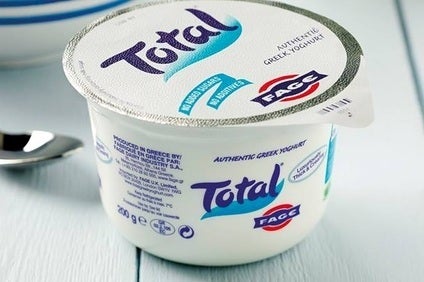
Greek dairy manufacturer Fage is eyeing growth in Europe as the Greek yoghurt craze in the US loses steam. Katy Askew caught up with the company at the SIAL exhibition in Paris to find out more.
Greek yoghurt has been a massive success story in the US, with exponential sales growth making headlines in recent years thanks to growing interest in the strained protein-dense dairy product.

Discover B2B Marketing That Performs
Combine business intelligence and editorial excellence to reach engaged professionals across 36 leading media platforms.
Fage was the first company to introduce Greek yoghurt into the US and, according to data from investment bank Sanford Bernstein, accounted for 94% of a fledgling category in 2007.
However, amid competition from the likes of Chobani, Danone and General Mills, Fage has seen its share of the US Greek yoghurt category eroded.
Fage did try to capitalise on the growing recent US interest in the product. In 2008, Fage, which had been exporting from Greece, opened a plant in New York state. However, Sanford Bernstein, using figures from Nielsen, estimated last month that Fage was now fourth in the sector, with a share of just over 10%.
In the last year, the company has won back some sales from market leaders Chobani and Danone (its market share in 2013 had fallen to a low of 9%) but industry watchers warn the growth of the category in the US is slowing. “The Greek boom is now over,” analysts at Sanford Bernstein wrote last month.

US Tariffs are shifting - will you react or anticipate?
Don’t let policy changes catch you off guard. Stay proactive with real-time data and expert analysis.
By GlobalDataAccording to research from Euromonitor International, spoonable yoghurt sales – including Greek – are expected to slow to a growth rate of 6% through to 2018, compared to growth of 34% in the prior five years.
With Greek yoghurt now no longer a niche product in the US, volume and value sales growth have slowed to something approaching more normalised levels. “Every major yoghurt producer now offers several varieties of Greek yoghurt. However, sales of Greek yoghurt are starting to slow, as it is no longer a novelty product,” Euromonitor says.
However, Dorthe Mallis, Fage’s export administrator, is confident the company will be able to offset any slowdown in the US by accelerating growth in the rest of the world. Fage’s group sales have been strong, indicating its strength outside the US. In the first six months of this year, the company saw sales increase 22.6% to US$340m. Growth was primarily driven by volume gains, with some positive impact from currency exchange and pricing adjustments.
In particular, Mallis, who is responsible for export sales from Fage’s Greek production facility, says growth in Europe is likely to continue to gather pace.
“In Europe there is still space because the wave [of popularity] is coming back from the USA… Greek yoghurt has been booming in the USA and now it is coming back again to the European market,” she says.
Fage, which exports products to more than 40 countries, is category leader in Greece. Outside of Greece and the US, the group also has sales offices in the UK, Italy and Germany.
“The UK was our first export market and we established sales there back in the 1980s. Growth was always in the UK but at the momenet it has become fastest in Italy… Our company built a different yoghurt category (internationally). Greek yoghurt became famous first through our sales in the UK. It is us who created this different yoghurt category,” Mallis says.
Elsewhere in Europe, Fage is witnessing “good” growth in the “important” markets of Germany and the Netherlands. But Mallis sees the potential for broad-based growth throughout the region. “We are trying to deliver sales in all our countries. Greek yoghurt is booming in Europe. It is the second day at SIAL and we have already run out of product. This has already been a very busy show for us.”
Within Europe, Fage does face competition from so-called Greek-style yoghurt manufactured by the likes of Danone. However, the company could potentially benefit from the unique selling point that European PDO and PDI legislation means only yoghurt manufactured in Greece can be labelled as Greek yoghurt.
This led to Chobani being banned from calling its products Greek yoghurt in the UK, causing it to quit the UK in 2013. The firm has since had moves to challenge the ruling quashed.
Mallis will not be drawn on the advantages that the regulations could bring the company. Rather she is confident to stand by the product based on its message of “quality as well as authenticity”.
Mallis stresses the “thick creamy yoghurt” is “low in fat and high in protein” thanks to the unique straining process that characterises its manufacture.
Beyond these on-trend attributes, Mallis adds European consumers are becoming aware of different uses for Greek yoghurt. “It is a healthy alternative. It can be eaten as a satisfying and filling snack thanks to its high protein levels. It can also be used in cooking, as a replacement for crème fraîche or cream. We are confident that we can continue to grow in Europe as well as our other international markets.”





